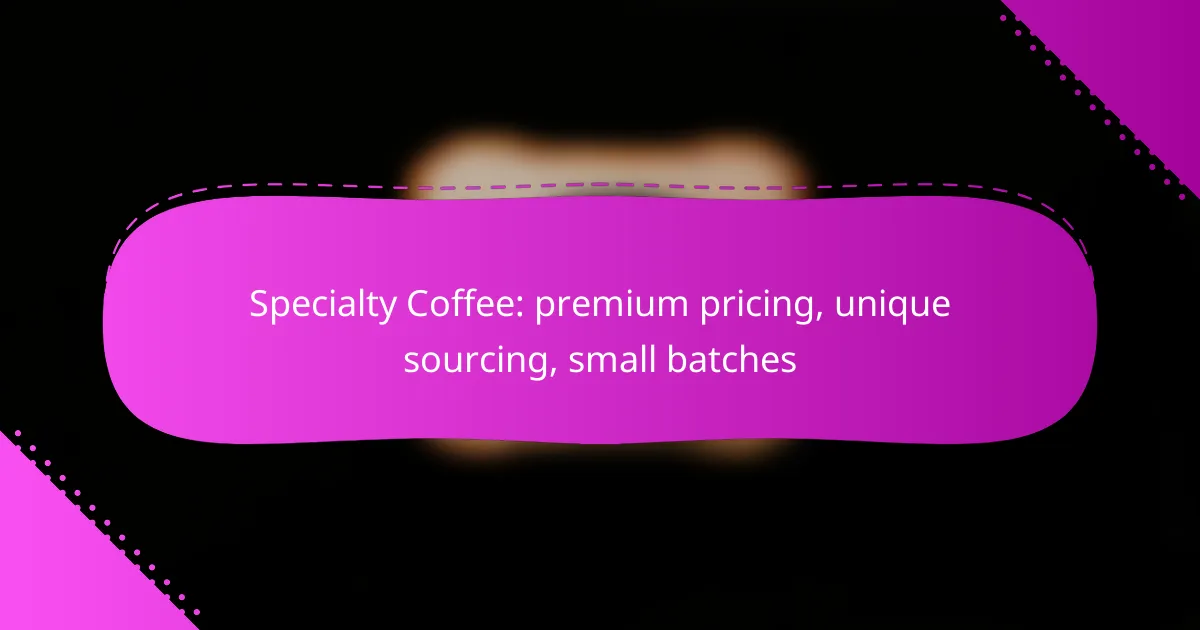Specialty coffee is distinguished by its premium pricing, which reflects the unique sourcing, small batch production, and high quality standards involved in its creation. In New Zealand, prices typically range from NZD 15 to NZD 30 per bag, highlighting the labor-intensive processes that contribute to its exceptional flavor profiles. Coffee enthusiasts seek out these meticulously crafted beans, often available through local roasters and online retailers, to experience the rich diversity of origins and roasting techniques.

How is specialty coffee priced in New Zealand?
Specialty coffee in New Zealand is priced significantly higher than regular coffee due to its unique sourcing, small batch production, and quality standards. Prices typically range from NZD 15 to NZD 30 per bag, reflecting the labor-intensive processes and careful selection involved in its production.
Factors influencing premium pricing
Several factors contribute to the premium pricing of specialty coffee. First, the sourcing of beans from specific regions known for their unique flavor profiles often involves higher costs due to limited supply and ethical farming practices. Additionally, small batch roasting requires more attention and skill, further driving up the price.
Quality control is another critical factor; specialty coffee must meet rigorous standards set by organizations such as the Specialty Coffee Association. This includes grading based on flavor, aroma, and absence of defects, which adds to the overall cost.
Comparison with regular coffee pricing
Regular coffee typically costs between NZD 5 to NZD 15 per bag, reflecting its mass production and lower quality standards. In contrast, specialty coffee’s higher price point is justified by its unique characteristics and the meticulous processes involved in its cultivation and roasting.
For consumers, this means that while regular coffee may be more affordable, specialty coffee offers a distinct experience with complex flavors and aromas that are often not found in standard blends.
Market trends in specialty coffee pricing
In recent years, the specialty coffee market in New Zealand has seen a steady increase in prices due to rising demand for high-quality products. Consumers are becoming more willing to pay a premium for ethically sourced and sustainably produced coffee, which is reflected in retail prices.
Additionally, global supply chain challenges and climate change impacts on coffee-growing regions have led to fluctuations in availability and pricing. As a result, consumers may notice price increases in specialty coffee over time, making it essential to stay informed about market trends and sourcing practices.

What makes specialty coffee unique?
Specialty coffee stands out due to its exceptional quality, unique sourcing methods, and meticulous production processes. These factors contribute to its premium pricing and distinct flavor profiles, making it a sought-after choice for coffee enthusiasts.
Distinct sourcing methods
Specialty coffee is often sourced from specific regions known for their unique growing conditions, such as high altitudes and specific climates. Farmers typically cultivate these beans using sustainable practices, which may include organic farming and direct trade relationships with roasters.
This sourcing approach ensures that the beans are of the highest quality, often resulting in certifications like Fair Trade or Rainforest Alliance. These certifications not only guarantee ethical practices but also enhance the coffee’s market value.
Small batch production benefits
Small batch production allows roasters to maintain a high level of quality control throughout the roasting process. By roasting limited quantities, they can focus on achieving the perfect roast profile that highlights the unique characteristics of each bean.
This method also enables roasters to experiment with different roasting techniques and flavor profiles, leading to a diverse range of offerings. Consumers often appreciate the artisanal approach, which can justify the higher price point associated with specialty coffee.
Flavor profiles of specialty coffee
The flavor profiles of specialty coffee are incredibly diverse, influenced by factors such as the origin of the beans, processing methods, and roasting techniques. Common tasting notes include fruity, floral, nutty, and chocolatey flavors, which can vary widely even within the same region.
To fully appreciate these flavors, it’s recommended to use proper brewing methods, such as pour-over or French press, which can enhance the coffee’s complexity. Understanding these profiles can help consumers choose coffees that align with their personal taste preferences.

Where to buy specialty coffee in New Zealand?
Specialty coffee in New Zealand can be purchased from various sources, including online retailers, local roasters, and subscription services. These options provide access to premium beans that are often sourced from unique origins and roasted in small batches.
Top e-commerce platforms for specialty coffee
Several e-commerce platforms specialize in specialty coffee, offering a wide selection from various roasters. Websites like Coffee for Less and Coffee Culture allow you to browse and purchase different blends and single-origin coffees.
When shopping online, consider factors such as shipping costs, delivery times, and whether the platform offers subscriptions for regular deliveries. Many platforms also provide tasting notes and brewing recommendations to enhance your coffee experience.
Local roasters with online shops
New Zealand is home to numerous local roasters that sell specialty coffee directly through their online shops. Roasters like Roast Busters and Heart Roasters focus on sourcing high-quality beans and roasting them in small batches to ensure freshness and flavor.
Buying from local roasters not only supports the community but also allows you to discover unique flavors specific to New Zealand’s coffee culture. Many roasters offer detailed information about their sourcing practices and roasting profiles, helping you make informed choices.
Subscription services for specialty coffee
Subscription services for specialty coffee provide a convenient way to enjoy a variety of premium beans delivered to your door. Companies like Coffee Snobs and The Coffee House offer customizable plans that allow you to select your preferred roast types and delivery frequency.
When choosing a subscription service, look for options that allow you to pause or cancel your subscription easily. Some services also provide exclusive access to limited-edition roasts or collaborations with local farmers, enhancing your coffee journey.

What are the benefits of small batch coffee?
Small batch coffee offers several advantages, including enhanced quality control, superior freshness, and unique flavor profiles. These benefits stem from the meticulous sourcing and roasting processes that characterize small batch production.
Quality control advantages
Small batch coffee allows roasters to maintain strict quality control throughout the production process. By focusing on limited quantities, roasters can closely monitor each batch for consistency and flavor, ensuring that only the best beans are used.
This approach often involves handpicking beans and using artisanal roasting techniques, which can lead to a more refined final product. Roasters can make adjustments based on the specific characteristics of the beans, enhancing the overall quality.
Freshness and flavor retention
Freshness is a key benefit of small batch coffee, as these batches are typically roasted and sold quickly. This means that consumers can enjoy coffee at its peak flavor, often within days of roasting.
Additionally, smaller batches are less likely to sit on shelves for extended periods, which can lead to stale flavors. Many small batch roasters emphasize the importance of consuming their coffee within a few weeks of roasting to fully appreciate its unique taste.

How does sourcing impact specialty coffee?
Sourcing significantly influences specialty coffee by determining its quality, flavor profile, and price. The methods used to source coffee beans can affect everything from the ethical implications to the unique characteristics of the final product.
Direct trade vs. fair trade sourcing
Direct trade sourcing involves coffee roasters purchasing beans directly from farmers, often leading to higher prices for producers and better quality control. This method allows roasters to establish personal relationships with growers, ensuring transparency and often resulting in fresher beans.
In contrast, fair trade sourcing focuses on ensuring that farmers receive a minimum price for their coffee, promoting fair wages and sustainable practices. While it supports ethical standards, the quality of beans can vary since the focus is more on the economic aspect than on direct relationships.
Impact of origin on flavor
The origin of coffee beans plays a crucial role in their flavor profile, with different regions producing distinct taste characteristics. For example, Ethiopian coffees are often fruity and floral, while Colombian varieties tend to be balanced with nutty undertones.
Factors such as altitude, climate, and soil composition contribute to these flavor differences. When selecting specialty coffee, consider the origin to find a profile that suits your palate, as well as to appreciate the unique attributes of each region’s beans.

What are the criteria for selecting specialty coffee?
Specialty coffee is selected based on its unique characteristics, including quality, flavor, and sourcing practices. Key criteria involve grading systems, roast profiles, and the overall production process, which often emphasizes small-batch methods and ethical sourcing.
Understanding coffee grading systems
Coffee grading systems evaluate beans based on factors like size, weight, and defects. The Specialty Coffee Association (SCA) uses a 100-point scale, where coffees scoring 80 or above are considered specialty. Grading involves cupping, where trained tasters assess aroma, flavor, acidity, and body.
When selecting specialty coffee, look for beans that have been graded by reputable organizations. High-quality beans typically have fewer defects and exhibit distinct flavor profiles that reflect their origin. For example, Ethiopian coffees often have fruity and floral notes, while Colombian varieties might present a balanced sweetness.
Evaluating roast profiles
Roast profiles significantly influence the flavor and aroma of coffee. Light roasts preserve the original characteristics of the beans, highlighting their unique origins, while medium and dark roasts develop deeper flavors through caramelization and roasting time. Understanding these profiles helps in selecting coffee that matches personal taste preferences.
When evaluating roast profiles, consider the roast level indicated on the packaging. A light roast may be described as bright and acidic, while a dark roast might be bold and smoky. Experimenting with different roast levels can enhance your appreciation of specialty coffee and help you discover your ideal flavor profile.
